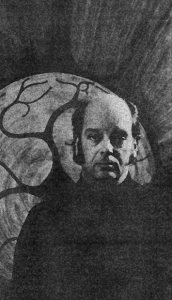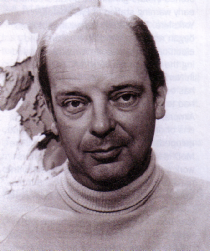Born 3rd June 1927 – Died 27 May 1981
Kit Pedler was a British medical scientist, science fiction author and science writer. Kit Pedler was born into a fourth generation medical family and trained in medicine at London’s King’s College Hospital. In his own words, “as a doctor and biological scientist I have lived in various experimental laboratories since the age of 18”. Earning a second doctorate in Experimental Pathology, he lectured at the University of London and set up the Unviversity’s Institute of Opthalmology, where he undertook 12 years of research on eye diseases and the functions of the retina, publishing 38 original medical papers. Doctor Pedler’s entry in the Medical Dictionory 1969 (his last year in practice) listed the highlights of his distinguished career, modestly summing up his other achievements with “etc”.
That “etc” disguised several self reinventions by this extraordinary polymath, who was more commonly referred to as Dr Kit Pedler or just Kit. His hobbies included building racing cars and like his mother was also an artist and sculptor. Pedler had a stint on Doctor Who where he and Gerry Davis invented the Cybermen from Mondas.
He also used science to explain paranormal activity.
Kit Pedler was the head of the electron microscopy department at the Institute of Ophthalmology, University of London, where he published a number of papers.
Pedler’s first television contribution was for the BBCtv programme Horizon.
In the mid-1960s, Pedler became the unofficial scientific adviser to the Doctor Who production team. Hired by Innes Lloyd to inject more hard science into the stories, Pedler formed a particular writing partnership with Gerry Davis, who was the programmes story editor.
Their interest in the problems of science changing and endangering human life had led them to create the Cybermen.
The idea of the Cybermen came to Kit when he fell ill and thought he might die in hospital, and he wondered what humanity’s fate would be if it became too obsessed with replacement surgery.
When he wrote his first Cybermen story, Kit Pedler had planned on the Cybermen returning in later stories.
Pedler wrote three scripts for Doctor Who: The Tenth Planet, The Moonbase and The Tomb of the Cybermen. He also submitted the story outlines that became The War Machines, The Wheel in Space and The Invasion.
Pedler and Davis devised and co-wrote Doomwatch, a British science fiction television programme produced by the BBC. The programme aired on BBC One for three seasons from 1970 to 1972
(37 x 50-minute episodes plus one unshown, of which only 24 exist in the BBC archives), covered a government department that worked to combat technological and environmental disasters. Pedler and Davis contributed to the first two series.
Pedler and Davis re-used the plot of the first episode of the series, The Plastic Eaters, for their 1971 novel Mutant 59: The Plastic Eater. The book expands upon on the TV episode making a superb read.
His non-fiction book The Quest for Gaia gave practical advice on creating an ecologically sustainable lifestyle, using James Lovelock’s Gaia hypothesis.
He died of a heart attack at his home in Doddington, Kent, at the age of 54 by his girlfriend Cherry Gilliam, while completing production of Mind Over Matter, a series for Thames Television on the paranormal that he presented with Tony Bastable.
ITV publicised the series with pop star and 70’s icon Alvin Stardust and actor Donald Sinden.The series alos featured Eurovisiin song contest winner Lindsay De Paul.
Tony Bastable had to complete the series which was still broadcasting when Kit died. The complete series and scripts are still held by Fremantle Media Archive Sales based in London.
Kit Pedler is buried at All Saints’ Church in the Kent village of Graveney, where he lived before moving to nearby Doddington.
Bibliography
The Dynostar Menace (1975)
A fictional book by Kit Pedler and Gerry Davis
ISBN 0 330 24812 X
Frighteningly credible…
A series of sensational events aboard the giant reactor Dynostar point to the presence of a saboteur among its international crew.
Hideous death from scorching ultra-violet radiation threatens an unsuspecting world if the project’s automatic countdown cannot be stopped.
Why is the saboteur prepared to kill, perhaps even to die himself?
He must be identified before disaster brings life on earth to a close…
“There is a brutal, explosive ending and a fine plausible detail” The Daily Mirror
“Against a background of successive deaths and mounting tension, this expertly told story moves to a dramatic climax” The Sunday Times
The Quest for Gaia (1979)
A non fiction book by Dr. Kit Pedler
ISBN 0-586-08365-0
Front cover illustration by Jenny Tylden Wright
Published by Paladin an imprint of Grafton Books in 1991.
Previously published by Granada Publishing 1981 222 pages.
Man, according to the late Kit Pedler, stands at a critical moment in history, when he must reassess his relationship with the web of interactions that make up the total lifeform of the planet. This lifeform he calls ‘Gaia’, after the earth-mother goddess of the planet itself. We are now provoking her wrath with our high technology and our destruction of the natural balance and harmony of the earth.
The Quest for Gaia is an exhilarating and optimistic book, a challenge to reject the culture of those called by the author ‘technologist toymakers’, and to recapture, not some romantic golden age, but a truly rich and sustainable future for both ourselves and our Earth. Kit Pedler suggests highly practical ways in which each one of us can change his or her way of life to halt the technological Behemoth-and live again in harmony with the lifeform of which we are part. A classic of its kind, The Quest for Gaia is an inspiring personal statement and an exhilarating challenge to everyone concerned about the future of our planet.
‘A personal testimony, moving and lyrical in parts, of how we should relate to the living world’
TRIBUNE
Mind over matter (1981)
By Kit Pedler
A scientist’s view of the paranormal. Based on the Thames TV series. Published by Panther book/Granada. 251 pages
Metal-bending…telepathy…healing…poltergeists…remote viewing…precognition…out-of-body experience…
Inexplicable? Impossible? Yes, by the rules of orthodox physics. Scientists have always been sceptical, if not downright dismissive, of such ‘paranormal’ events. Many instances have been shown to be frauds, but recently, hard experimental evidence has been building up, evidence which forces us to re-evaluate our idea of what is ‘possible’. We cannot ignore evidence which shows us that ‘impossible’ happens, just because it upsets our established picture of reality’.
Some of the most revolutionary ideas are coming from the world’s most highly respected physics labs, such as Berkeley or Cambridge, and from the most eminent physicists, some of them Nobel Prize winners. These exciting ideas suggest that the world is not hard-edged and utterly predictable, but that mind and matter really can influence each other.
Kit Pedler is unusually well qualified to take the critical but open-minded approach that a study of the paranormal needs.Trained in medicine, with a second doctorate for his work on the eye, he has also worked on computer simulation of brain cells and written several documentaries for television about science projects. Mind Over Matter stems from the research that he did for the Thames Television series of the same name, which he wrote and presented.
Mind Over Matter is an engrossing, open-minded survey of all aspects of the paranormal. It suggests that metal-bending, telepathy, precognition and out-of-the-body experiences may not after all be the domain of frauds and freaks alone.
The TV series which accompanied the book, was made into seven half hour episodes broadcast on Tuesdays at 7pm over the Summer of 1981. Kit Pedler presented the series with Tony Bastable, who would be familiar to anyone who saw children’s television show Magpie.
Precognition, telepathy, clairvoyance and psychokenesis were just some of the fascinating concepts explored in the series.
As you would expect of Kit, the series was based in solid science fact and dealt with proof, not speculation.
Undercurrents Magazine
Kit was also a contributor to Undercurrents magazine. This was started as a medium for radical views on scientific and technological subjects; it was published in England between 1972[1] and 1984: 63 editions altogether. For much of that period it appeared every two months and the circulation peaked at 7,000 in the late 1970s. It existed to promote Alternative technology – an infinitely elastic concept embracing almost every subject that so-called ‘straight’ scientists weren’t interested in.
Some of those subjects – such as renewable energy and waste-recycling, have become the conventional wisdom of the 21st century. Others, like leylines or dowsing – remain on the outer fringes of scientific endeavour.
A small sample from Undercurrents dated 16 June-July 1976
By Kit Pedler appears below:
“Alternative technology and the alternative lifestyle are rapidly approaching a crisis where progress could either accelerate rapidly or grind to a halt altogether. Time and time again, thoroughly happy events are organized where windmills are erected, solar panels grow warm and clichés are exchanged over home baked bread to an obligation of folk music. After the regulation discussions of imminent doom, the meetings break up and the participants go back to being parasitic on the very society they hold so objectionable and nothing is achieved.
The futile western man is now obviously a neck and neck race between the gentle freedoms of the individual and the completely efficient control process of ruthlessly organized national bureaucracies. Realistic alternative technologies have one great politically important function; they could restore some aspects of those freedoms to individuals who are fast becoming decerebrated by the media, stripped of skills by the seductions of the commercial world and made to work even harder at dehumanising tasks to earn money to pay grossly inflated prices for the basic necessities of food, warmth and shelter and to buy glittering artefacts of no conceivable function. No changes are in sight and the position grows inexorably worse. If people can really be offered detail plans of how to achieve their own independence by alternative means, then the centralized purveyors of their basic needs can be isolated and disemployed.”
Why not check out issues online at Scribd by entering the search term “Undercurrents”.


